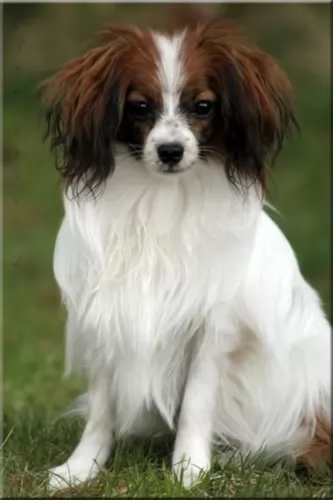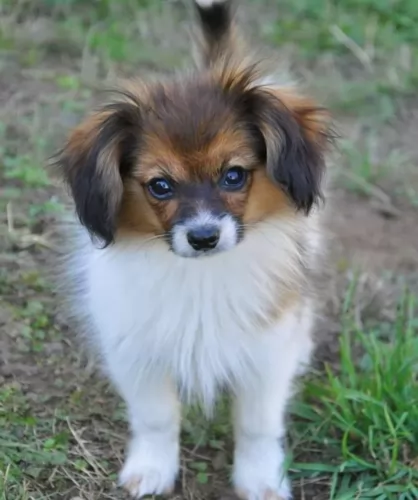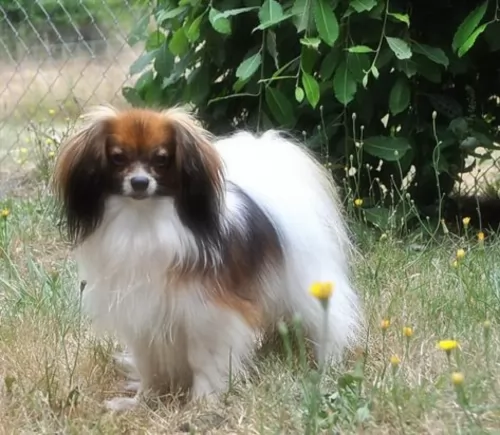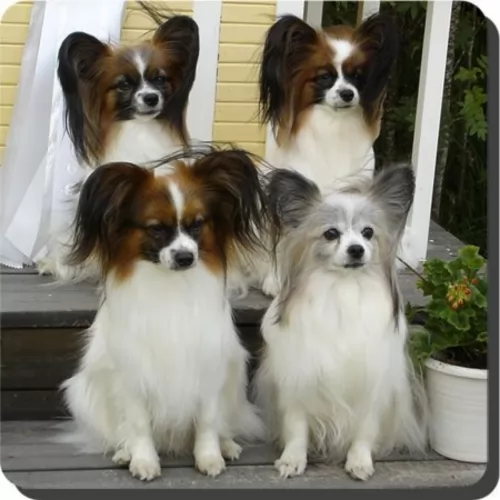 Petzlover
PetzloverPhalene is originated from France but Santal Hound is originated from India. Phalene may grow 17 cm / 6 inches shorter than Santal Hound. Phalene may weigh 7 kg / 15 pounds lesser than Santal Hound. Both Phalene and Santal Hound has almost same life span. Phalene may have less litter size than Santal Hound. Phalene requires Moderate Maintenance. But Santal Hound requires Low Maintenance
 The Phalène is a toy breed, and in fact the Papillon and Phalène differ only by their ears, but are exactly the same in all other ways.
The Phalène is a toy breed, and in fact the Papillon and Phalène differ only by their ears, but are exactly the same in all other ways.
Thought to have developed in Western Europe, its exact origin isn’t clear but it is an ancient breed, as paintings seem to indicate that it has been around since the 16th century.
It is essentially a companion dog today. The dog is classified as a variety of the Papillon by the AKC, with the FCI classifying it as a separate breed.
The Santal Hound has always been used for hunting and these Indian pariah dogs haven’t changed much over the years.
It is a small red Indian indigenous dog. It is named after the Santal tribe who used the dog for hunting. They sometimes refer to the dog as Seuta and Kukur.
When you do research on the Santal Hound, you will mostly find it among indigenous peoples. It isn’t only found in India but in Africa, being found among the different nomadic hunting tribes in East Africa.
 This toy breed stands at between 20 – 28cm in height and weighs around 4 – 5kg. He has floppy, silky ears and is a Papillon dog, and a Papillon with dropped ears is known as a Phalène.
This toy breed stands at between 20 – 28cm in height and weighs around 4 – 5kg. He has floppy, silky ears and is a Papillon dog, and a Papillon with dropped ears is known as a Phalène.
The dome of the head is rounded and the Phalene has a slim muzzle with bright, alert brown eyes and a black nose. The tail is well plumed and is carried over the back. The coat isn’t a double coat like many other dogs, but it is lustrous, being straight, long and smooth. The coat is available in a number of coat colors, essentially being a blend of white, tan, black and orange or fawn.
The Phalène is an intelligent dog, and they will be able to learn quickly and easily when you teach them how to sit, lie down or stay. Training and socialization is always excellent for dogs, even small ones like this as it teaches them to be obedient and well mannered.
The Phalene is a sociable, friendly dog but is inclined to be reserved around strangers. Phalènes are essentially lap dogs and they make great companions for all kinds of people as well as being great playmates for disciplined, kind children. Because he is small and calm, he makes a great pet for country- or city dwellers.
The Santal is considered a small to medium sized dog standing at between 40 and 45cm in height and weighing between 9 and 12 kilograms.
It is also slightly built with fine bones. The coat of the dog is reddish brown or yellow-brown, the eyes are almond shaped and brown and the muzzle is pointed. The ears of the dog are erect and point forward. The tail of this dog is usually curled over the dog’s back. The dog doesn’t really bark as such but howls instead. It has small paws and walks with a high-stepping style like a prancing horse.
These dogs are calm, independent, loving and loyal and also affectionate with their human family. He is cool with strangers.
They are alert, intelligent dogs and you certainly won’t have any trouble teaching him a few simple commands. He cleans himself like a cat. He seems to understand what you say as he always cocks his head to one side when you talk to him. He is a playful dog and will love to be involved with games with the children.
He can also get on well with other dogs in the family. He is capable of adapting to life in the city or the countryside just so long as his exercise needs are met.
 The Phalene is such a sweet little dog, and you can definitely count him as as ‘man’s best friend’. He just loves to be wherever his human family is, lapping up their attention indoors but also loving being with them outdoors. When well trained and socialized, these dogs make splendid playmates for children too.
The Phalene is such a sweet little dog, and you can definitely count him as as ‘man’s best friend’. He just loves to be wherever his human family is, lapping up their attention indoors but also loving being with them outdoors. When well trained and socialized, these dogs make splendid playmates for children too.
Small though he is, he makes a good watch dog too and he will bark to warn his human family of danger. Give him the love and care he so rightly deserves, and he promises to make you a splendid pet and companion.
The Santal dog is an unusual dog with some unique characteristics. He hasn’t got any particularly exceptional characteristics either, but he promises to make you a good pet.
He is capable of providing you with lots of love, and on top of that he is a low maintenance dog too.
When you bring him into your home, you’re going to get yourself a loyal, loving pet and companion.
 Your jaunty little Phalene can live to be up to 12 or 15 years of age if well cared for. Even so, there are always some of the more common dog illnesses worth knowing about, and we look at a few -
Your jaunty little Phalene can live to be up to 12 or 15 years of age if well cared for. Even so, there are always some of the more common dog illnesses worth knowing about, and we look at a few -
Any dog can get epilepsy – when your pet suddenly has a seizure or fit for no apparent reason. It can be disturbing to see, but with medication your pet can live a normal life.
Always keep a check on your pet’s eyes because there are a few eye diseases that can affect your pet and these are cataracts, progressive retina atrophy and entropion. Thankfully a veterinary ophthalmologist can help with the best treatment.
Dogs stand a better chance of avoiding sickness if they are fed well and they get a fair amount of exercise. But our fur kids can get sick anytime really, and it pays to know about some of the dangerous diseases they can succumb to -
Your dog will have a fever, he will be lethargic and have diarrhea with vomiting. It is a contagious virus affecting dogs that come into contact with the feces of an ill dog. It attacks a dog’s internal organs, and although the vet will do everything possible to help your dog, parvo is often fatal.
Your dog will be coughing, have respiratory problems, lethargy and weight loss. These parasites are found in your dog’s heart and are spread by mosquitoes. Check with your vet about treatments to prevent this horrible illness.
Have your pet vaccinated against rabies, a deadly diseases spread by saliva and a bite from an infected animal. It is fatal and once your dog has this disease, there is no treatment.
 These are energetic little dogs and will require getting a regular dose of exercise. He loves a walk and being allowed off his leash for a good run. He also loves ball games. Exercise is important for small dogs like this to ward off obesity.
These are energetic little dogs and will require getting a regular dose of exercise. He loves a walk and being allowed off his leash for a good run. He also loves ball games. Exercise is important for small dogs like this to ward off obesity.
These little dogs will need to have their ears checked and cleaned if you want to avoid ear infections. If you’re not sure how to clean the inside of the ears, rather leave it to an expert who can show you how its done. Small dogs always need to have their teeth checked regularly. He will also need to have his nails trimmed.
To maintain the long, silky coat, brush your dog at least twice a week. Some Phalene dog owners take their pet to the vet to have the coat professionally groomed and trimmed.
Provide your Santal Hound with top quality food to ensure his health. While there are some excellent commercially manufactured foods on the market, it is important to choose the high quality ones that have natural, good ingredients in them.
Try to include some home-made food for him which can be simply mixed into the dry kibble twice a week. Boiled chicken, brown rice or pasta and spinach, sweet potatoes and carrots are super tasty and nutritious. Your dog will love such simple, good food as it doesn’t upset his stomach.
If you can, try and include a little bit of raw meat to his diet occasionally as this can go towards ensuring he doesn’t get skin diseases.
Trim your dogs nails, check his eyes and ears for infection and check his teeth too.
Provide your dog with a warm, dry place to sleep.
Don’t allow your Santal Hound to have puppies. There are so many unwanted puppies all over the world. Rather have him or her spayed or neutered to avoid puppies that nobody wants. It is beneficial for his health too.